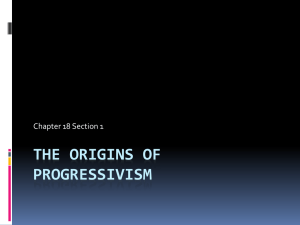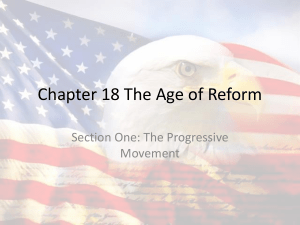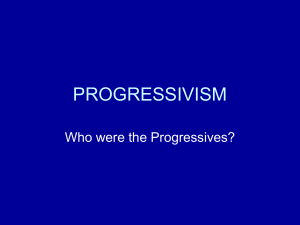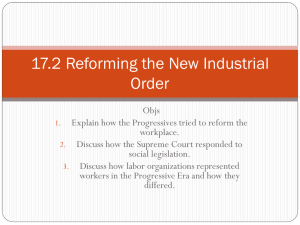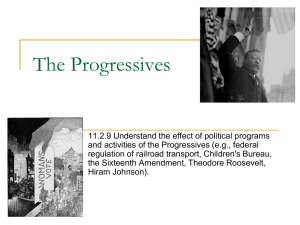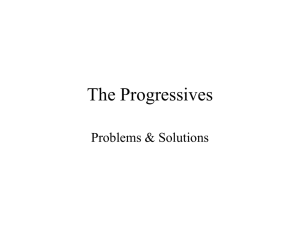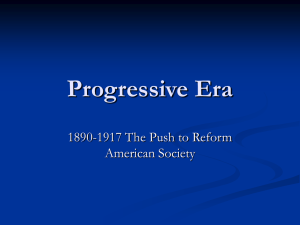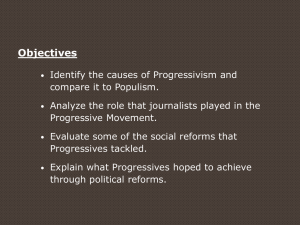The Progressive Assault on the American Constitution
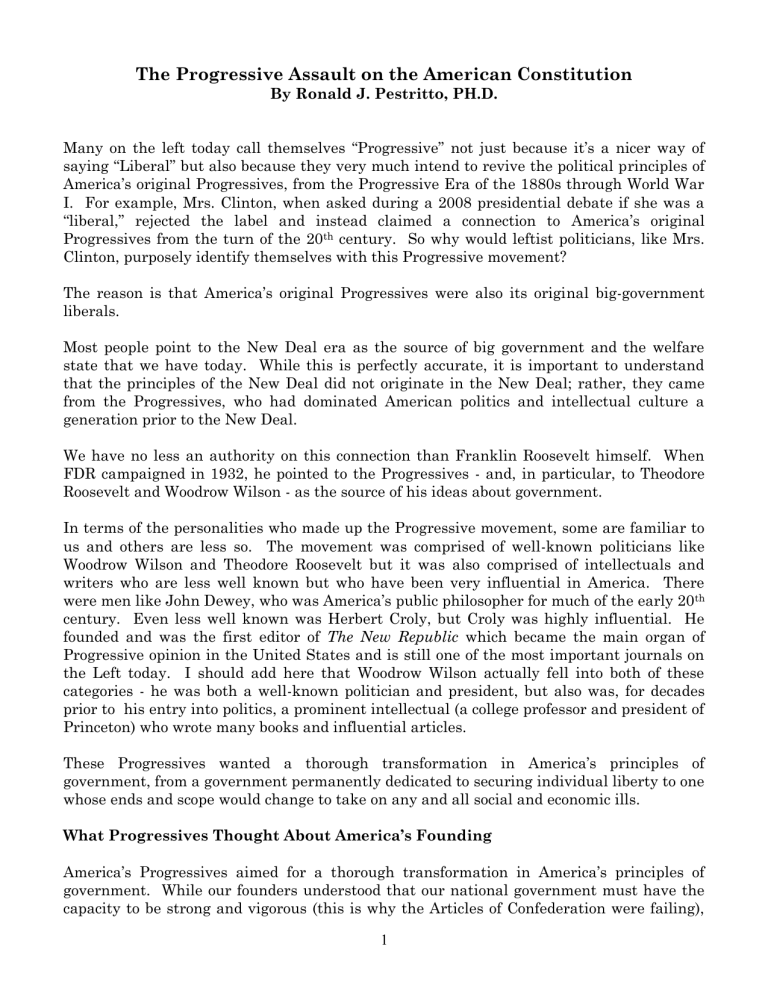
The Progressive Assault on the American Constitution
By Ronald J. Pestritto, PH.D.
Many on the left today call themselves “Progressive” not just because it’s a nicer way of saying “Liberal” but also because they very much intend to revive the political principles of
America’s original Progressives, from the Progressive Era of the 1880s through World War
I. For example, Mrs. Clinton, when asked during a 2008 presidential debate if she was a
“liberal,” rejected the label and instead claimed a connection to America’s original
Progressives from the turn of the 20 th century. So why would leftist politicians, like Mrs.
Clinton, purposely identify themselves with this Progressive movement?
The reason is that America’s original Progressives were also its original big-government liberals.
Most people point to the New Deal era as the source of big government and the welfare state that we have today. While this is perfectly accurate, it is important to understand that the principles of the New Deal did not originate in the New Deal; rather, they came from the Progressives, who had dominated American politics and intellectual culture a generation prior to the New Deal.
We have no less an authority on this connection than Franklin Roosevelt himself. When
FDR campaigned in 1932, he pointed to the Progressives - and, in particular, to Theodore
Roosevelt and Woodrow Wilson - as the source of his ideas about government.
In terms of the personalities who made up the Progressive movement, some are familiar to us and others are less so. The movement was comprised of well-known politicians like
Woodrow Wilson and Theodore Roosevelt but it was also comprised of intellectuals and writers who are less well known but who have been very influential in America. There were men like John Dewey, who was America’s public philosopher for much of the early 20 th century. Even less well known was Herbert Croly, but Croly was highly influential. He founded and was the first editor of The New Republic which became the main organ of
Progressive opinion in the United States and is still one of the most important journals on the Left today. I should add here that Woodrow Wilson actually fell into both of these categories - he was both a well-known politician and president, but also was, for decades prior to his entry into politics, a prominent intellectual (a college professor and president of
Princeton) who wrote many books and influential articles.
These Progressives wanted a thorough transformation in America’s principles of government, from a government permanently dedicated to securing individual liberty to one whose ends and scope would change to take on any and all social and economic ills.
What Progressives Thought About America’s Founding
America’s Progressives aimed for a thorough transformation in America’s principles of government. While our founders understood that our national government must have the capacity to be strong and vigorous (this is why the Articles of Confederation were failing),
1
they also were very clear that this strength must always be confined to very limited ends or areas of responsibility; government, in other words, while not weak or tiny, was to be strictly limited.
The Progressive conception of government, on the other hand, was quite the opposite;
Progressives had an “evolving” or a “living” notion of government (yes, we get the term
“living Constitution from the Progressives), and thus wanted government to take on whatever role and scope the times demanded. The Progressives reasoned that people of the founding era may have wanted a limited government, given their particular experience with
King George III, but they argued that people of their own time wanted a much more activist government and that we should adjust accordingly.
Quite simply, the Progressives detested the bedrock principles of American government.
They detested the Declaration of Independence, which enshrines the protection of individual natural rights (like property) as the unchangeable purpose of government. They detested the Constitution, which places permanent limits on the scope of government and is structured in a way that makes the extension of national power beyond its original purpose very difficult. “Progressivism” was, for them all about progressing, or moving beyond, the principles of our founders.
This is why the Progressives were the first generation of Americans to denounce openly our founding documents. Woodrow Wilson, for example, once warned that “if you want to understand the real Declaration of Independence, do not repeat the preface” -i.e. the part of the Declaration which talks about securing individual natural rights as the only legitimate purpose of government. And Theodore Roosevelt, when using the federal government to take over private businesses during the 1902 coal strike, is reported to have remarked, “To hell with the Constitution when people want coal!” This remark may be apocryphal but it is a fair representation of how TR viewed these matters.
How Progressives Enlarged the Scope of Government
If the Progressives wanted to disregard the Constitution in order to vastly enlarge the scope of government, how, as a practical matter, was this to be done? It happened in a variety of ways, but principal among them was a fundamental change in the American presidency.
Under the system of our founders, government was to have sufficient strength and energy to accomplish its ends, but those ends were strictly limited by the Constitution. The principal way in which the Constitution keeps the government within its boundaries is through the separation of powers. As readers of The Federalist and of Thomas Jefferson know, the point of separation of powers is to keep any one set of hands from wielding all of the power in national government.
The Progressives, especially Woodrow Wilson, hated the separation of powers for precisely this reason. It made government inefficient and made it difficult, if not impossible, to expand the power of government so that it could take on all of the new tasks those
Progressives had in mind. So they looked to the presidency as a way of getting around this obstacle and having, instead, a “living” Constitution.
2
Under the original system, the president was merely leader of a single branch, or part of the government, and thus could not provide leadership of the government as a whole. In his book Constitutional Government, Wilson urged that “leadership and control must be lodged somewhere.” The president, Wilson pointed out, was the only politician who could claim to speak for the people as a whole, and thus he called upon the president to rise above the separation of powers to consider himself not merely as chief of a single branch of government but as the popular leader of the whole of national politics. Wilson even contrasted the “constitutional aspect” of the presidency. Its Constitutionally defined role as chief of one of the three co-equal branches of government to the “political” function of the president, where he could use his connection to public opinion as a tool for moving all of the branches of government in the direction called for by the people.
It was in this way that Wilson believed the original intention of the separation of powers system could be circumvented and the enhanced presidency could be a means energizing the kind of active national government that the progressive agenda required.
Progressivism and Socialism
Since the Progressives had such a limitless view of state power, and since they wanted to down play the founders’ emphasis on individual rights, it is only natural to ask of they subscribed to Socialism. There are several things to consider in answering this question.
First, when considering the relationship of Progressivism to Socialism, we must be clear that we are talking about the similarity in the philosophy of government. We are not suggesting that America’s Progressives were the kind of moral monsters that we see in the history of some Socialist or Fascist regimes (although it is the case that their racial views - particularly those of Woodrow Wilson - were indeed morally reprehensible).
Second, we must also bear in mind that there was an actual Socialist movement during the
Progressive Era, and prominent Progressives such as Wilson and Theodore Roosevelt were critics of it. In fact, Wilson and Roosevelt both ran against a Socialist candidate in the 1912 election (Eugene Debs). The Progressives were ambivalent about the Socialist movement of their day, not so much because they disagreed with it in principle but because the American
Socialist movement was a movement of the lower classes. The Progressives were elitists; they looked down their noses at the Socialists, considering them a kind of rabble.
Keeping these points in mind, it is, nonetheless, the case that the Progressive conception of government closely coincided with the Socialist conception. Both Progressivism and
Socialism champion the prerogatives of the state over the rights of the individual. Wilson himself made this connection very plain in a revealing essay he wrote in 1887 called
“Socialism and Democracy.” Wilson begins this essay by defining Socialism, explaining that it stands for unfettered state power, which trumps any notion of individual rights. It
“proposes” that all ideas of a limitation of public authority by individual rights be put out of view,” Wilson wrote, and “that no line can be drawn between private and public affairs which the State may not cross at will.” After laying out this definition of Socialism, Wilson
3
explains that he finds nothing wrong with it in principle, since it was merely the logical extension of genuine democratic theory. It gives all power to the people, in their collective capacity, to carry out their will through the exercise of governmental power, unlimited by any undemocratic idea like individual rights. He elaborated:
In fundamental theory, Socialism and Democracy are almost if not quite one and the same. They both rest at bottom upon the absolute right of the community to its own destiny and that of its members. Limits of wisdom and convenience to the public control there may be; limits of principle there are, upon strict analysis, none.
Roosevelt, too, argued for a new conception of government, where individual natural rights would no longer serve as a principled boundary that the state was prohibited from crossing.
He called in his New Nationalism program for the State to take an active role in effecting economic equality by way of superintending the use of private property. Private property rights, which had been serving as a brake on the more aggressive Progressive policy proposals, were to be respected, Roosevelt argued, only insofar as the government approved of the property’s social usefulness. He wrote:
We grudge no man a fortune in civil life if it is honorably obtained and well used. It is not even enough that it should have been gained without doing damage to the community. We should permit it to be gained only so long as the gaining represents benefit to the community. This, I know, implies a policy of a far more active governmental interference with social and economic conditions in this country than we have yet had, but I think we have got to face the fact that such an increase in governmental control is now necessary.
Progressives Yesterday and Today
There are important connections between America’s original Progressive Era and the crisis we are facing today, and it is useful to consider these connections on two levels.
The first connection is at a general level and concerns our abandonment of the Constitution.
The present crisis did not appear out of nowhere, and didn’t simply begin with the election of Barack Obama. Politicians of both parties spent the better part of the 20 th century disregarding the Constitution, as they looked to have government step up to solve every conceivable human problem. Thus, it ought to be no surprise that the Constitution’s limits on government aren’t even part of the conversation today as our politicians debate the new interventions in our economy and society that seem to come daily.
Such a state of things would have greatly pleased America’s original Progressives. As I’ve endeavored to explain, Progressives believed that the role of government should be determined not by our Constitution, but by whatever the needs of the day happened to be.
This is why they sought to eradicate talk of the Constitution from our political discourse; today, that goal seems to have been realized.
4
The second connection between the original Progressive Era and our situation today has to do with policy. The Progressives knew that our original system of government was not capable of handling all of the new tasks that they had in mind for it. So they envisioned creating a vast set of bureaucratic agencies. They argued that Congress should enact very broad and vague laws for supervising more and more facets of the American economy and society, and then delegate to the bureaucratic agencies the power and discretion to enact specific policies. Both Woodrow Wilson and Theodore Roosevelt conceived of government in this way.
The New Deal certainly went a long way toward implementing this Progressive vision, and what we have seen in our own situation with TARP and the various other interventions is simply greater steps toward the Progressive plan. Our Congress has simply said to the
Treasury agencies: Here’s a trillion dollars, here’s all the legal authority you need, now go out, determine what is in the public interest and spend and regulate accordingly. That is the Progressive vision of government in a nutshell. It is also the model being used to implement “Obamacare.”
As lengthy as the healthcare bill is, it is actually quite vague about how the new system is to work. Instead, the bill mentions the Secretary of Health and Human Services, on average, more than once per page. This is for the purpose of empowering the secretary, and a vast bureaucratic apparatus, with the authority needed to make the specific rules and regulations for our healthcare system. With near limitless power to make decisions affecting our health and major portion of our economy, government under today’s
Progressives is on the verge of fulfilling the pernicious dreams of America’s original
Progressives.
_____________________________________________________________________________________
For a more in-depth introduction to the Progressives, readers may see Pestritto’s book
American Progressivism. For more on how Woodrow Wilson was a central figure in the
Progressive movement and in laying the ground work for today’s Progressive government, readers may see Pestritto’s book Woodrow Wilson and the Roots of Modern Liberalism.
5
